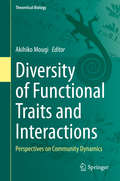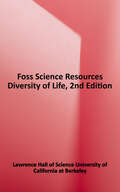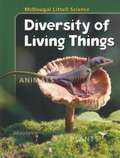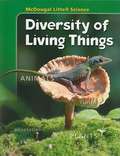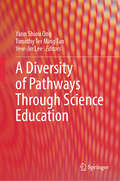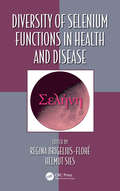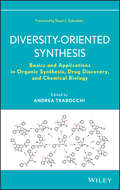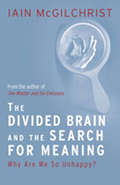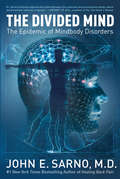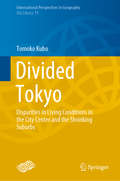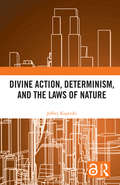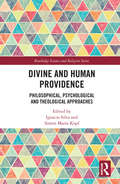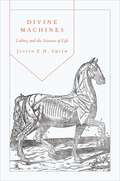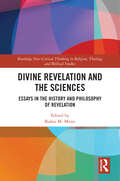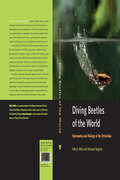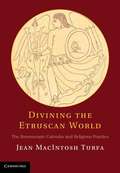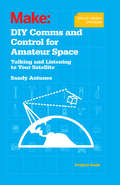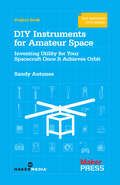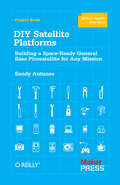- Table View
- List View
Diversity of Functional Traits and Interactions: Perspectives on Community Dynamics (Theoretical Biology)
by Akihiko MougiThis book presents new theoretical perspectives on ecological community dynamics and in so doing casts fresh light on the enduring complexity–stability debate. Real ecological communities do not simply comprise diverse species and interactions, which respectively represented the nodes and links of the classic network theory. Rather, they are characterized by different types of complexity, and this book explains how this diversity of complexity is key to understanding the dynamics of ecological communities. It is shown how various properties in natural communities, such as life history, adaptation, density dependence, sex, interaction types, space, functional traits, and microbial processes, can dramatically increase the complexity in ecological communities. Furthermore, innovative methods are introduced that may be applied to cast light on very complex communities. With each chapter presenting the latest advances and approaches, the book sets the direction for future research on ecological community dynamics. It will be a “must read” for researchers and students in the field of ecology.
Diversity of Life: FOSS Science Resources
by Lawrence Hall of Science University of California at BerkeleyNIMAC-sourced textbook
Diversity of Life
by Lawrence Hall of Science University of California at BerkeleyThis book contains the following chapters including Science Safety Rules, Glossary and Index: What Is Life, The Microscope, The Cell, Domains, Plants: The Vascular System, Plant Reproduction and Growth, Insects, Diversity of Life.
Diversity of Life Resources: Images, Data and Readings
by FOSS Middle School Curriculum Development TeamThe book presents the diversity of life with images and related data and readings.
Diversity of Life Resources: Images, Data, and Readings
by Lawrence Hall of Science University of California at BerkeleyNIMAC-sourced textbook
Diversity of Living Things
by Mcdougal LittellIn this book you will see how scientific knowledge keeps growing and changing as scientists ask new questions and rethink what was known before.
The Diversity of Living Things 2018: Module D Grades 6-8 (2018 Edition) (HMH Science Dimensions)
by Michael A. DiSpezio Marjorie Frank Michael R. HeithausNIMAC-sourced textbook
A Diversity of Pathways Through Science Education
by Yew-Jin Lee Yann Shiou Ong Timothy Ter Ming TanThis book presents the work of academics who contributed their work at the International Science Education Conference (ISEC) 2021, in alignment with the conference theme '20/20 Vision for Science Education Research.' Collectively, the chapters aim to evoke intellectual dialogues on current and future trends in science education. It features chapters that are grouped thematically into three sections: Questions and Questioning in Science/STEM education, Developing Science Teaching and Assessment, and History, Philosophy, and Sociology of Science/Engineering, and Informal Learning. Through the various sections, the book presents empirical studies in science and engineering classrooms or laboratories, puts forward a framework for problem-based learning, provides an account of a prominent scientist’s efforts in promoting practical science through analysis of historical documents, and uncovers trends in informal science learning space research through a review of literature. Each section is introduced by a commentary with further insights and thought-provoking questions on ideas raised in the chapters. The book also includes a 'Notes to Our Future Colleagues' section in each chapter, which presents readers with a collective vision for the state of science education research in the year 2050.
Diversity of Selenium Functions in Health and Disease
by Regina Brigelius-Flohé Helmut SiesNamed after Selene, Greek goddess of the moon, selenium (Se) has moved has moved from being thought of as a toxicant to being considered an essential nutrient with the potential to reduce cancer risk in the span of seven decades. Diversity of Selenium Functions in Health and Disease focuses on current knowledge of aspects of Se research relevant to
Diversity-Oriented Synthesis
by Stuart L. Schreiber Andrea TrabocchiDiscover an enhanced synthetic approach to developing and screening chemical compound librariesDiversity-oriented synthesis is a new paradigm for developing large collections of structurally diverse small molecules as probes to investigate biological pathways. This book presents the most effective methods in diversity-oriented synthesis for creating small molecule collections. It offers tested and proven strategies for developing diversity-oriented synthetic libraries and screening methods for identifying ligands. Lastly, it explores some promising new applications based on diversity-oriented synthesis that have the potential to dramatically advance studies in drug discovery and chemical biology.Diversity-Oriented Synthesis begins with an introductory chapter that explores the basics, including a discussion of the relationship between diversity-oriented synthesis and classic combinatorial chemistry. Divided into four parts, the book:Offers key chemical methods for the generation of small molecules using diversity-oriented principles, including peptidomimetics and macrocyclesExpands on the concept of diversity-oriented synthesis by describing chemical librariesProvides modern approaches to screening diversity-oriented synthetic libraries, including high-throughput and high-content screening, small molecule microarrays, and smart screening assaysPresents the applications of diversity-oriented synthetic libraries and small molecules in drug discovery and chemical biology, reporting the results of key studies and forecasting the role of diversity-oriented synthesis in future biomedical researchThis book has been written and edited by leading international experts in organic synthesis and its applications. Their contributions are based on a thorough review of the current literature as well as their own firsthand experience developing synthetic methods and applications.Clearly written and extensively referenced, Diversity-Oriented Synthesis introduces novices to this highly promising field of research and serves as a springboard for experts to advance their own research studies and develop new applications.
The Divided Brain and the Search for Meaning
by Iain McgilchristIn this 10,000-word essay, written to complement Iain McGilchrist's acclaimed The Master and His Emissary, the author asks why - despite the vast increase in material well-being - people are less happy today than they were half a century ago, and suggests that the division between the two hemispheres of the brain has a critical effect on how we see and understand the world around us. In particular, McGilchrist suggests, the left hemisphere's obsession with reducing everything it sees to the level of minute, mechanistic detail is robbing modern society of the ability to understand and appreciate deeper human values. Accessible to readers who haven't yet read The Master and His Emissary as well as those who have, this is a fascinating, immensely thought-provoking essay that delves to the very heart of what it means to be human.
The Divided Mind
by John E. SarnoThe book that will change the way we think about health and illness, The Divided Mind is the crowning achievement of Dr. John E. Sarno's distinguished career as a groundbreaking medical pioneer, going beyond pain to address the entire spectrum of psychosomatic (mindbody) disorders. The interaction between the generally reasonable, rational, ethical, moral conscious mind and the repressed feelings of emotional pain, hurt, sadness, and anger characteristic of the unconscious mind appears to be the basis for mindbody disorders. The Divided Mind traces the history of psychosomatic medicine, including Freud's crucial role, and describes the psychology responsible for the broad range of psychosomatic illness. The failure of medicine's practitioners to recognize and appropriately treat mindbody disorders has produced public health and economic problems of major proportions in the United States. One of the most important aspects of psychosomatic phenomena is that knowledge and awareness of the process clearly have healing powers. Thousands of people have become pain-free simply by reading Dr. Sarno's previous books. How and why this happens is a fascinating story, and is revealed in The Divided Mind.
Divided Tokyo: Disparities in Living Conditions in the City Center and the Shrinking Suburbs (International Perspectives in Geography #11)
by Tomoko KuboThis book explores how and why Tokyo has been divided over time in terms of living conditions. First, recent urban discourses that explain the transformation of Tokyo’s urban structure are examined, along with social changes and the expansion of unequal residential conditions within the metropolitan area. Chapter 1 reviews: 1) discussions on globalization, neo-liberalization, and changes in housing policies; 2) debates on the divided city; 3) debates on the shrinking city and the urban lifecycle; 4) discussion of the urban residential environment from a social justice perspective; and 5) family–housing relationships in the post-growth society. Based on the literature review, the rest of the book is structured as follows. Chapter 2 explains the changes in urban and housing policies, demography, and socio-economic conditions. In Chapters 3 to 5, the background and characteristics of the growth of condominium living in the city center are examined. The next three chapters analyze the reality of shrinking suburbs, using case studies to demonstrate the increase in vacant housing and local responses toward shrinkage. In Chapter 9, possible solutions are proposed for dealing with problems related to urban shrinkage and the expanding gap in terms of the availability of investments to stimulate urban development, the residential environment, and the population age structure in Japanese cities by comparing the author’s findings and the literature review. This book provides deep insights for urban and housing scholars, urban planners, policy decision-makers, and local communities that struggle with aging populations and urban shrinkage.
Divine Action, Determinism, and the Laws of Nature
by Jeffrey KoperskiA longstanding question at the intersection of science, philosophy, and theology is how God might act, or not, when governing the universe. Many believe that determinism would prevent God from acting at all, since to do so would require violating the laws of nature. However, when a robust view of these laws is coupled with the kind of determinism now used in dynamics, a new model of divine action emerges. This book presents a new approach to divine action beyond the current focus on quantum mechanics and esoteric gaps in the causal order. It bases this approach on two general points. First, that there are laws of nature is not merely a metaphor. Second, laws and physical determinism are now understood in mathematically precise ways that have important implications for metaphysics. The explication of these two claims shows not only that nonviolationist divine action is possible, but there is considerably more freedom available for God to act than current models allow. By bringing a philosophical perspective to an issue often dominated by theologians and scientists, this text redresses an imbalance in the discussion around divine action. It will, therefore, be of keen interest to scholars of Philosophy and Religion, the Philosophy of Science, and Theology.
Divine and Human Providence: Philosophical, Psychological and Theological Approaches (Routledge Science and Religion Series)
by Ignacio Silva Simon KopfThis volume offers an original perspective on divine providence by examining philosophical, psychological, and theological perspectives on human providence as exhibited in virtuous human behaviours. Divine providence is one of the most pressing issues in analytic theology and philosophy of religion today, especially in view of scientific evidence for a natural world full of indeterminacies and contingencies. Therefore, we need new ways to understand and explain the relations of divine providence and creaturely action. The volume is structured dynamically, going from chapters on human providence to those on divine providence, and back. Drawing on insights from virtue ethics, psychology and cognitive science, the philosophy of providence in the face of contingent events, and the theology of grace, each chapter contributes to an original overall perspective: that human providential action is a resource suited specifically to personal action and hence related to the purported providential action of a personal God. By putting forward a fresh take on divine providence, this book enters new territory on an age-old issue. It will therefore be of great interest to scholars of theology and philosophy.
Divine Machines: Leibniz and the Sciences of Life
by Justin Smith-RuiuThough it did not yet exist as a discrete field of scientific inquiry, biology was at the heart of many of the most important debates in seventeenth-century philosophy. Nowhere is this more apparent than in the work of G. W. Leibniz. In Divine Machines, Justin Smith offers the first in-depth examination of Leibniz's deep and complex engagement with the empirical life sciences of his day, in areas as diverse as medicine, physiology, taxonomy, generation theory, and paleontology. He shows how these wide-ranging pursuits were not only central to Leibniz's philosophical interests, but often provided the insights that led to some of his best-known philosophical doctrines. Presenting the clearest picture yet of the scope of Leibniz's theoretical interest in the life sciences, Divine Machines takes seriously the philosopher's own repeated claims that the world must be understood in fundamentally biological terms. Here Smith reveals a thinker who was immersed in the sciences of life, and looked to the living world for answers to vexing metaphysical problems. He casts Leibniz's philosophy in an entirely new light, demonstrating how it radically departed from the prevailing models of mechanical philosophy and had an enduring influence on the history and development of the life sciences. Along the way, Smith provides a fascinating glimpse into early modern debates about the nature and origins of organic life, and into how philosophers such as Leibniz engaged with the scientific dilemmas of their era.
Divine Revelation and the Sciences: Essays in the History and Philosophy of Revelation (Routledge New Critical Thinking in Religion, Theology and Biblical Studies)
by Balázs M. MezeiThis book provides an in-depth analysis of the relationship between the sciences and the concept of divine revelation. It includes a historical overview of the notion of revelation, its role in scientific debates over the centuries, and current challenges in light of non-religious and especially non-revelational proposals. The volume emphasizes that discussions of divine revelation cannot be limited to theology alone but must also involve scientific and philosophical approaches. The contributions examine methodological, ethical, and theoretical questions related to the sciences. The main argument is that divine revelation not only played a historical role in shaping our understanding of knowledge but is also present in contemporary scientific endeavours and will continue to be important in the future. Divine revelation is considered to be a critical element of human existence that cannot be avoided in any scientific context. The book will be relevant to scholars of theology and philosophy, particularly those interested in religion and science.
Diving Beetles of the World: Systematics and Biology of the Dytiscidae
by Kelly B. Miller Johannes BergstenThe first comprehensive book in more than a century to reveal the diversity and natural history of diving beetles.Among the hundreds of thousands of species of beetles, there is one family, containing some 4,300 species, that stands out as one of the most diverse and important groups of aquatic predatory insects. This is the Dytiscidae, whose species are commonly known as diving beetles. No comprehensive treatment of this group has been compiled in over 130 years, a period during which a great many changes in classification and a near quadrupling of known species has occurred.In Diving Beetles of the World, Kelly B. Miller and Johannes Bergsten provide the only full treatments of all 188 Dytiscid genera ever assembled. Entomologists, systematists, limnologists, ecologists, and others with an interest in aquatic systems or insect diversity will find these extensively illustrated keys and taxon accounts immensely helpful. The keys make it possible to identify all taxa from subfamily to genera, and each key and taxon treatment is accompanied by both photographs and detailed pen-and-ink drawings of diagnostic features. Every genus account covers body length, diagnostic characters, classification, species diversity, a review of known natural history, and world distribution. Each account is also accompanied by a range map and at least one high-resolution habitus image of a specimen. Diving beetles are fast becoming important models for aquatic ecology, world biogeography, population ecology, and animal sexual evolution and, with this book, the diversity of the group is finally accessible.
Divining the Etruscan World
by Jean Macintosh TurfaThe Etruscan Brontoscopic Calendar is a rare document of omens foretold by thunder. It long lay hidden, embedded in a Greek translation within a Byzantine treatise from the age of Justinian. The first complete English translation of the Brontoscopic Calendar, this book provides an understanding of Etruscan Iron Age society as revealed through the ancient text, especially the Etruscans' concerns regarding the environment, food, health, and disease. Jean MacIntosh Turfa also analyzes the ancient Near Eastern sources of the Calendar and the subjects of its predictions, thereby creating a picture of the complexity of Etruscan society reaching back the before the advent of writing and the recording of the calendar.
DIY Comms and Control for Amateur Space: Talking and Listening to Your Satellite
by Sandy AntunesRadio spectrum for commanding and recording from our satellites is a shared resource with subtle hurdles. We walk the path originally paved by AMSATs to discuss the steps and licensing needed to set up and operate both a command uplink and a data download station and network. Find out how playing nicely with others maximizes your ability to get your data down.
DIY Instruments for Amateur Space: Inventing Utility for Your Spacecraft Once It Achieves Orbit
by Sandy AntunesWhat can you measure and what are your limits when orbiting in space? Learn about what physical quantities you can measure and what types of sensors you can buy or build. We cover the 5 essential design limits as well: power, bandwidth, resolution, computing... and legal limitations. Explore what you can play with using your own personal satellite.
DIY Mushroom Cultivation: Growing Mushrooms at Home for Food, Medicine, and Soil (Homegrown City Life)
by Willoughby Arevalo"Offering clear and comprehensive instructions for low-tech growing for a range of budgets, interests, and scales, this book offers practical inspiration and a sense that "hey, I can do this!" –— DANIELLE STEVENSON, owner, DIY FungiDIY Mushroom Cultivation is full of proven, reliable, low-cost techniques for home-scale cultivation that eliminate the need for a clean-air lab space to grow various mushrooms and their mycelium.Beautiful full-color photos and step-by-step instructions accompany a foundation of mushroom biology and ecology to support a holistic understanding of the practice. Growing techniques are applicable year-round, for any space from house to apartment, and for any climate, budget, or goal. Techniques include:Setting up a home growing spaceInexpensive, simple DIY equipmentCulture creation from mushroom tissue or sporesGrowing and using liquid cultures and grain spawnGrowing mushrooms on waste streams Indoor fruitingOutdoor mushroom gardens and logsHarvesting, processing, tinctures, and cooking.Whether you hunt mushrooms or dream about growing and working with them but feel constrained by a small living space, DIY Mushroom Cultivation is the ideal guide for getting started in the fascinating and delicious world of fungiculture.
DIY Satellite Platforms: Building a Space-Ready General Base Picosatellite for Any Mission
by Sandy AntunesWant to build your own satellite and launch it into space? It’s easier than you may think. The first in a series of four books, this do-it-yourself guide shows you the essential steps needed to design a base picosatellite platform—complete with a solar-powered computer-controlled assembly—tough enough to withstand a rocket launch and survive in orbit for three months.Whether you want to conduct scientific experiments, run engineering tests, or present an orbital art project, you’ll select basic components such as an antenna, radio transmitter, solar cells, battery, power bus, processor, sensors, and an extremely small picosatellite chassis. This entertaining series takes you through the entire process—from planning to launch.Prototype and fabricate printed circuit boards to handle your payloadChoose a prefab satellite kit, complete with solar cells, power system, and on-board computerCalculate your power budget—how much you need vs. what the solar cells collectSelect between the Arduino or BasicX-24 onboard processors, and determine how to use the radio transmitter and sensorsLearn your launch options, including the providers and cost requiredUse milestones to keep your project schedule in motion
